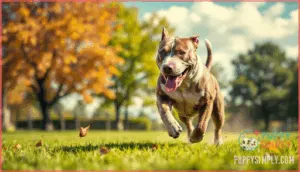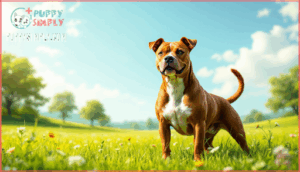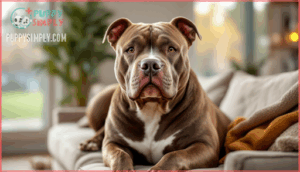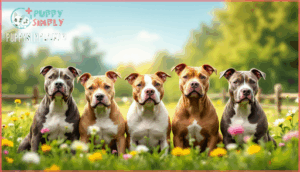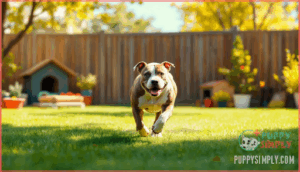This site is supported by our readers. We may earn a commission, at no cost to you, if you purchase through links.

Understanding these differences isn’t just semantic splitting—it affects everything from breed-specific legislation that might restrict where you can live to the specific health concerns and training approaches your dog will need. When you know what type of pitbull you’re actually looking at, you’re better equipped to provide the targeted care these loyal, often misunderstood dogs deserve.
Table Of Contents
- Key Takeaways
- What Defines a Pitbull?
- Officially Recognized Pitbull Breeds
- Distinctive Pitbull Types and Variations
- Popular Pitbull Mixes and Hybrids
- Key Considerations for Pitbull Owners
- Frequently Asked Questions (FAQs)
- What are the most common health issues associated with pitbulls?
- How much exercise does a pitbull typically need each day?
- What are the best training methods for pitbulls?
- How can I prevent my pitbull from displaying aggressive behavior?
- What are some activities that I can do with my pitbull to keep them entertained and stimulated?
- How much exercise do pitbull breeds need daily?
- Are pitbulls good with children and other pets?
- What is the average lifespan of pitbull breeds?
- How much does it cost to own a pitbull?
- Do pitbulls require special grooming or maintenance?
- Conclusion
Key Takeaways
- "Pitbull" isn’t a single breed—it’s an umbrella term covering four officially recognized breeds (American Pit Bull Terrier, American Staffordshire Terrier, Staffordshire Bull Terrier, and American Bully) plus countless variations, which matters because breed-specific legislation, health concerns, and training needs differ significantly across these types.
- These dogs were selectively bred for bite inhibition toward humans throughout their history, with temperament studies confirming that environment and training—not breed—determine aggression, contradicting widespread myths about inherent danger.
- Physical variations like blue nose and red nose pitbulls are simply color genetics within the American Pit Bull Terrier, not separate breeds, though unethical breeding for rare colors increases health risks like skin allergies and immune disorders.
- Over 700 U.S. cities enforce breed-specific restrictions on pitbull ownership, but momentum is shifting—since 2018, more than 100 jurisdictions have repealed breed bans in favor of behavior-based policies, with 21 states now protecting ownership rights entirely.
What Defines a Pitbull?
The term "pitbull" breaks the mold of traditional breed classification—it’s not about pedigree papers or a single bloodline. Instead, you’re looking at a powerful label applied to dogs based on their muscular appearance and shared ancestry from 19th-century bull-and-terrier crosses.
Understanding what truly defines these dogs means exploring their roots, physical traits, and the temperament that’s made them both controversial and beloved.
Origins and Breed History
The Pit Bull Breed History traces back to early 19th-century Britain, where breeders crossed Old English Bulldogs with terriers to create Bull and Terrier dogs. This Breed Development combined bulldogs’ strength with terriers’ agility, shaping the Genetic Heritage of today’s American Pit Bull Terrier and related breeds.
- Bloodsport roots: These dogs were bred for bull baiting until the Cruelty to Animals Act of 1835 banned it, shifting focus to ratting—where "pit" in their name originated
- Immigration wave: Bull-and-terrier dogs arrived in the US during the 1870s, adapting to American working roles and evolving into distinct strains
- Registry milestones: The United Kennel Club recognized the American Pit Bull Terrier in 1898, establishing formal breed standards
- Temperament selection: Breeders consistently favored bite inhibition toward humans, culling dogs that showed trainer aggression
- Modern transformation: Once symbols on WWI and WWII recruitment posters, these breeds evolved from controversial Ancient Origins into beloved family companions. The Staffordshire Bull Terrier has a rich breed history background that contributes to its unique characteristics.
Physical Characteristics
You can spot most pitbull-type dogs from across a dog park—their signature muscular frames, broad chests, and blocky heads give them away before you even see their faces. These Pit Bull Breed Characteristics include powerful Muscle Mass, wide-set Facial Features, and pronounced Head Shape that define their commanding presence.
The American Pit Bull Terrier usually displays a smooth, short coat in varied Coat Patterns, while their athletic Body Structure reflects centuries of selective breeding for strength and agility.
Temperament Traits
Beneath that muscular exterior, pitbulls carry a temperament that surprises most people who’ve only heard the myths—these dogs are loyal, affectionate, and keen to please their families. Their emotional intelligence shines through proper socialization methods, turning them into gentle companions when you invest time in canine behavior and training from puppyhood.
Pitbulls surprise most people with their loyal, affectionate temperament—they’re eager to please and become gentle companions through proper socialization and training
Key Pit Bull Breed Characteristics include:
- High Trainability: Their intelligence and people-pleasing nature make trainability tips effective when you use positive reinforcement.
- Outstanding Loyalty Levels: They form deep bonds with family members and thrive on human connection.
- Misunderstood Aggression Factors: Canine behavior and psychology research shows breed doesn’t predict aggression—environment and training do.
- Playful Energy: Dog behavior and temperament studies confirm they’re naturally exuberant and affectionate with proper socialization.
Officially Recognized Pitbull Breeds
When you’re ready to bring a pitbull into your life, you’ll want to know which breeds actually carry that official stamp of recognition. The kennel clubs don’t agree on everything, but they’ve drawn clear lines around four distinct breeds that make up the pitbull family.
Let’s break down each one so you can see what sets them apart.
American Pit Bull Terrier
The American Pit Bull Terrier is the most athletic of all Pitbull-type dogs, recognized by the United Kennel Club since 1898. This medium-framed powerhouse weighs 30–60 pounds and reaches 17–21 inches tall, making it perfect for families seeking an active companion. DNA analysis reveals this breed dominates genetic testing at 14.8%—outpacing even Labs and German Shepherds combined.
| Characteristic | Male | Female |
|---|---|---|
| Height | 18–21 inches | 17–20 inches |
| Weight | 35–60 pounds | 30–50 pounds |
| Exercise Needs | 60+ min/day | 60+ min/day |
| Temperament | Confident, loyal | Affectionate, energetic |
| Training Level | High intelligence | High intelligence |
Understanding the pitbull breed types is essential for owners to provide the right care. Your American Pit Bull Terrier thrives with structured Pitbull Training and proper Dog Nutrition. These dogs demand consistent socialization to channel their natural canine conduct positively. Without adequate exercise needs being met, they’ll redirect that legendary energy elsewhere—and you won’t like where.
American Staffordshire Terrier
Since 1936, the American Staffordshire Terrier has stood as the poster child for bully breeds seeking American Kennel Club legitimacy. This stocky companion—18–19 inches tall and 40–70 pounds—ranks 75th nationally for good reason: confident intelligence meets good-natured devotion.
Training methods must start early to channel their powerful build productively. Your family dynamics improve when exercise needs (45+ minutes daily) stay consistent.
Breed standards distinguish them from the American Pit Bull Terrier through decades of selective refinement, making grooming tips simpler with their short, low-maintenance coat.
Staffordshire Bull Terrier
UK Kennel Club recognition came to the Staffordshire Bull Terrier in 1935—your 14–16 inch, 24–38 pound powerhouse bred from Victorian-era bull-and-terrier stock. Terrier training demands consistency because this breed’s 11.3–12 year lifespan thrives on structured dog nutrition and preventive Staffordshire care targeting cataracts and demodicosis.
- Command respect through early socialization that transforms raw courage into family loyalty
- Defy stereotypes with breed standards proving smaller pit bull types deliver massive heart
- Release potential when terrier intelligence meets your unwavering leadership
American Bully
Recognized by the UKC in 2013, this companion breed redefines what bully breeds can achieve—your Pocket, Standard, or XL American Bully brings blocky-head charisma to families demanding loyalty without aggression.
Bully training unlocks gentle temperament when dog nutrition fuels that muscular build, proving breed standards favor function over fighting heritage.
Canine conduct transforms through structured pet grooming routines and socialization that separates modern pit bull descendants from outdated myths.
Distinctive Pitbull Types and Variations
Beyond the four official breeds, pitbulls show fascinating variations that break the mold of what people expect. You’ll notice differences in nose color, body type, and coat patterns that give each dog its own signature look.
Let’s examine what sets these variations apart and what they mean for you as an owner.
Blue Nose Vs Red Nose Pitbulls
You’ve probably heard pit bull breeds described by nose color—but what’s really behind these color variations? Blue Nose and Red Nose Pitbulls aren’t separate pit bull breeds at all. They’re color variants within the American Pit Bull Terrier, governed by nose color genetics. Here’s what sets them apart:
- Blue Nose pitbulls carry a rare recessive dilution gene (dd), creating their signature grey-blue nose, coat, and eyes—though this genetic concentration increases health risks like skin allergies.
- Red Nose pitbulls express the homozygous recessive bb genotype, producing reddish-brown noses, amber eyes, and fawn coats traced back to Irish bloodlines from the 1800s.
- Neither affects pitbull temperament—breed standards confirm both variants share identical loyalty, intelligence, and energy levels inherent to pitbull-type dogs.
Despite marketing hype, no kennel club recognizes these as distinct breeds. Both require the same training, socialization, and health monitoring you’d provide any pit bull breed.
Size and Build Differences
If you think all pitbulls look the same, their official breed standards tell a different story—these dogs range from compact 30-pound athletes to 80-pound powerhouses with dramatically different builds.
The Staffordshire Bull Terrier tops out around 38 pounds with concentrated muscle mass, while the American Pit Bull Terrier stretches to 65 pounds with a leaner, more athletic body structure.
American Bullies dominate size categories—pocket, standard, and giant—with some reaching 80 pounds of solid physical attributes that reshape what pit bull breeds can look like.
Coat Colors and Markings
Pitbulls wear their genetics on their sleeves—or rather, their coats—with color patterns ranging from solid blue-gray to brindle tiger stripes that can help you identify breed lineage at a glance. Red Nose Pitbulls display chestnut coats with matching copper-toned noses, while Blue Nose varieties showcase gray coloring that extends to their nose, eyes, and even toenails.
Breed standards recognize virtually every coat variation—from merle patterns to white markings—though color genetics don’t determine temperament in these pitbull-type dogs.
Popular Pitbull Mixes and Hybrids
Pitbull mixes combine the strength and loyalty of purebred pitbulls with traits from other breeds, creating dogs with unique appearances and temperaments.
You’ll find these crossbreeds in shelters and homes across the country, each offering something different from their purebred counterparts.
Understanding what to expect from these hybrids can help you make an informed choice about whether a mix is right for your lifestyle.
Common Pitbull Crossbreeds
Mixed breeds outnumber purebreds in pitbull-type dogs—over 50% carry pitbull genetics without official breed status. You’ll find at least 45 documented pitbull crossbreeds, with these five leading adoption centers:
- Bullypit (American Bulldog-Pitbull)—40 to 90 pounds of muscle and loyalty
- Labrabull (Labrador-Pitbull)—keen to please with boundless energy
- Boxerbull (Boxer-Pitbull)—playful guardian with protective instincts
- Beagle-Pitbull—compact 30-40 pound tracker with terrier tenacity
- Springer Pit (Springer Spaniel-Pitbull)—athletic 35-50 pound companion
These hybrid breed developments showcase pitbull genetics’ adaptability across diverse lineages.
Appearance and Temperament of Mixes
When you mix pitbull genetics with another breed, you’re rolling the dice on which parent’s traits will dominate—though that muscular chest and blocky head usually find a way through. Pitbull hybrids inherit crossbreed characteristics unpredictably—your Labrabull might showcase a Lab’s gentle mouth or a pitbull’s terrier drive.
Temperament testing reveals mixed breed traits that demand early canine conduct assessment. These pitbull-type dogs blend loyal, energetic personalities with variable prey drive and stranger reactivity depending on hybrid health and lineage.
Considerations When Adopting a Mix
Before you sign adoption papers for that adorable pitbull mix at the shelter, you’ll need to reckon with breed-specific legislation that could make your new companion illegal in certain zip codes—even if she’s only a quarter pitbull by DNA.
The adoption process for mixed breed pitbull-type dogs requires owner preparation beyond standard dog ownership and care—verify housing policies, investigate rescue challenges like unknown hybrid health history, and commit to responsible dog ownership through professional behavioral assessment before bringing your pit bull home.
Key Considerations for Pitbull Owners
Owning a pitbull isn’t just about loving their loyalty—it’s about understanding what they need to thrive. From proper training to managing legal hurdles, you’ll face unique responsibilities that demand your attention.
Here’s what you need to know before bringing one of these powerful dogs into your life.
Training and Socialization Needs
Your pitbull’s future hinges on the foundation you build in those critical early months—miss this window, and you’re fighting an uphill battle for the rest of their life. Positive reinforcement drives obedience training success, while early socialization techniques expose your dog to diverse environments, people, and animals.
Responsible dog ownership demands consistent conduct management and understanding canine communication cues. Structured dog training and socialization sessions shape canine conduct patterns, helping you master this powerful breed’s potential through deliberate, science-backed methods that establish your authority from day one.
Health and Wellness Concerns
Dominance over breed-specific vulnerabilities starts with recognizing the silent threats that undermine your pitbull’s vitality. Skin allergies plague over 60% of cases—wheat, soy, and pollen trigger relentless scratching that compromises their armor. Three critical battlegrounds demand your vigilance:
- Musculoskeletal integrity: Hip dysplasia strikes 20% of pitbulls, while knee injuries affect 15% over age five—weight management and physical therapy slash progression rates by 25%.
- Vision preservation: Cataracts threaten 5-10% with hereditary blindness, but early detection improves outcomes in 70% of cases.
- Metabolic control: Hypothyroidism and obesity (affecting 10-20%) steal years from their lifespan—veterinary-approved nutrition tips and vaccine schedules form your defensive foundation.
Master these pit bull health and wellness essentials, and you’ll command canine health outcomes that separate champions from casualties in dog health management and breed characteristics understanding.
Legal and Breed-Specific Restrictions
Beyond the breed debates lies a harsh reality: over 700 U.S. cities enforce breed-specific legislation targeting your pitbull, while 21 states have banned these discriminatory laws entirely. Enforcement policies vary wildly—Miami-Dade mandates confiscation, Denver requires microchipping and probation, yet Texas protects your ownership rights completely.
Regulatory reforms are shifting momentum: since 2018, 100+ jurisdictions repealed breed bans favoring behavior-based public safety frameworks, with 62% of Americans now supporting this legislation trend transformation in dog breed classification and pit bull breed overview standards.
| Jurisdiction Type | Restriction Level | Your Action Required |
|---|---|---|
| Ban states (e.g., Miami-Dade) | Ownership prohibited | Relocate or appeal through animal control |
| Restricted cities (e.g., Denver) | Licensing + behavioral tests | Submit to 36-month evaluation, limit two dogs |
| Protected states (19 total) | No breed-specific legislation | Verify kennel club regulations, maintain insurance |
| International regions (30+ countries) | Import bans or permits | Research microchipping, muzzling mandates before travel |
Frequently Asked Questions (FAQs)
What are the most common health issues associated with pitbulls?
Hip Dysplasia ranks among the top orthopedic concerns, causing joint instability and pain.
Skin Problems, including Allergy Issues, frequently plague pit bulls due to their short coats and genetic predispositions.
Degenerative Myelopathy and Heart Conditions also affect these powerful dogs, requiring vigilant monitoring for peak Canine Health and Wellness.
How much exercise does a pitbull typically need each day?
Most pitbull-type dogs need 60 to 90 minutes of daily exercise to manage their energy output and maintain canine health and wellness.
Combine physical activity levels with mental stimulation through structured playtime requirements, training sessions, and interactive games to keep your dog balanced and content.
What are the best training methods for pitbulls?
Intelligent dogs like pitbulls thrive when you channel their energy through Positive Reinforcement and Clicker Training. These methods build trust and obedience without dominance tactics.
Start with Housebreaking Tips and Leash Manners, then advance to Obedience Exercises.
Proper Dog Training and Socialization shapes Canine Conduct, transforming your Pit Bull into a confident companion through consistent Dog Training and Conduct practices.
How can I prevent my pitbull from displaying aggressive behavior?
Consistent, structured training builds confidence and trust. Start with positive reinforcement, rewarding calm conduct immediately.
Learn canine body language to spot aggression triggers early.
Practice socialization techniques regularly, exposing your pit bull to varied environments gradually, which strengthens impulse control and reduces reactive tendencies.
What are some activities that I can do with my pitbull to keep them entertained and stimulated?
Keeping a muscular companion mentally sharp requires more than just walks around the block. Agility training challenges their athletic build, while obedience exercises reinforce canine conduct fundamentals.
Scent work engages natural instincts, hiking adventures burn energy, and playtime activities strengthen your bond through dog training and socialization that’s essential for proper dog care and maintenance.
How much exercise do pitbull breeds need daily?
Your pitbull needs at least 60 to 90 minutes of physical activity daily to stay healthy and balanced. This breed-specific requirement includes structured exercise routine tips like brisk walks, fetch sessions, and fitness training advice.
These activities build both muscle and mental sharpness while supporting proper canine conduct and dog care maintenance.
Are pitbulls good with children and other pets?
Properly socialized pitbulls often thrive with children and other pets. These dogs were bred as loyal family companions and frequently work as service and therapy dogs.
However, early animal socialization and consistent training are essential for household harmony and child safety around any dog breed.
What is the average lifespan of pitbull breeds?
Most Pitbull breeds live 12 to 16 years, though genetic influence, health factors, and your care directly shape their aging process.
American Pitbull Terriers and related pit bull breeds thrive longer with proper nutrition and exercise, making pitbull longevity a reflection of responsible ownership.
How much does it cost to own a pitbull?
Owning a pit bull usually costs $1,000–$2,000 in initial costs for adoption fees, vaccinations, and supplies. Monthly expenses run $100–$300, covering food budgets, veterinary care, and insurance options.
Responsible pet ownership means planning for unexpected medical bills and investing in proper training to guarantee your dog’s wellbeing and your peace of mind.
Do pitbulls require special grooming or maintenance?
Unlike high-maintenance breeds that demand constant primping, pit bulls are refreshingly low-fuss. Their short coat needs occasional bathing, weekly brushing for shedding control, and regular nail trimming.
Focus on skin health through routine checks and proper pet care, and you’ll keep your canine companion thriving without special grooming marathons.
Conclusion
Think of understanding types of pitbulls like learning to read a map before starting a journey—it prepares you to navigate the terrain ahead with confidence. Knowing these breed distinctions gives you real power, whether you’re advocating against discriminatory legislation, selecting the right training protocol, or simply understanding your rescue dog’s heritage.
The differences between these muscular, loyal companions aren’t just trivia—they’re tools that transform you from a casual owner into an informed advocate who can provide precisely what your dog needs to thrive.
- https://www.pitbullhero.org/pit-bull-dogs-and-breeds
- https://www.pitbullinfo.org/pit-bulls-population
- https://bobosbestkennels.com/title-the-ultimate-guide-to-american-bully-varieties-pocket-standard-classic-and-xl/
- https://worldanimalfoundation.org/dogs/pitbull-statistics/
- https://www.ukcdogs.com/american-pit-bull-terrier

